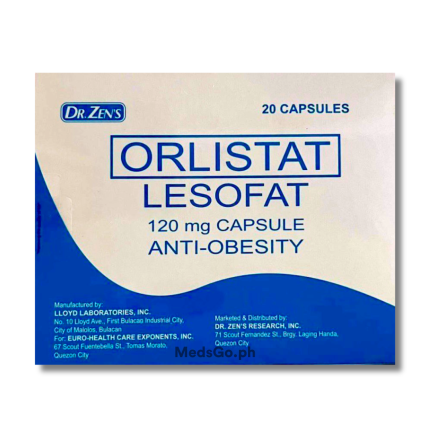Indications / Uses
LESOFAT Orlistat 120mg is used for the long-term management of obesity and overweight in conjunction with a reduced-calorie diet. It works by inhibiting enzymes that break down dietary fats, thereby reducing the amount of fat absorbed by the body. This medication is particularly indicated for patients with a body mass index (BMI) of 30 kg/m² or greater, or 27 kg/m² if other risk factors such as high blood pressure or diabetes are present.
Formulation / Ingredients
LESOFAT Orlistat 120mg contains: Orlistat 120mg.
Do I need prescription to buy LESOFAT Orlistat 120mg?
No prescription required to purchase LESOFAT Orlistat 120mg. You can order it right now on our website.
Side Effects
LESOFAT Orlistat 120mg common side effects include: oily spotting on underwear, flatulence with discharge, fatty or oily stools, and an urgent need to have a bowel movement. Other frequent effects may include abdominal pain, liquid stools, increased frequency of defecation, and low blood sugar levels in some individuals.
Directions and Dosage
- Adults (18+ years): 120 mg capsule taken 3 times daily.
- Adolescents (12–18 years): 120 mg capsule taken 3 times daily.
The capsule should be taken with water immediately before, during, or up to 1 hour after each main meal. If a meal is missed or contains no fat, the dose should be omitted. Maximum treatment duration depends on weight loss progress; however, the daily dosage should not exceed 3 capsules in 24 hours.
Contraindications
This medication is contraindicated in individuals with chronic malabsorption syndrome or cholestasis. It must not be used by those with known hypersensitivity to the active substance or any of the inactive components of the formulation.
Special Precautions
- Monitor for symptoms of liver dysfunction such as dark urine or yellowing of the skin.
- Maintain a nutritionally balanced, low-calorie diet where fat accounts for approximately 30% of caloric intake.
- Ensure adequate intake of fat-soluble vitamins by using a supplement at bedtime.
- Caution is advised for those with a history of kidney stones or chronic kidney disease.
Is it safe to take it with other medications?
Interactions may occur with certain treatments for epilepsy, thyroid conditions, and blood-thinning medications. Absorption of cyclosporine and fat-soluble vitamins (A, D, E, and K) may be reduced when taken concurrently.
How should I store it?
Store in a cool, dry place at temperatures not exceeding 30°C. Keep the container tightly closed and protect from light and moisture.
Used For
- Obesity management
Age
- 12 years & up
Features
- Orlistat
Reviews
No reviews found
Pharmacist answers to questions about LESOFAT Orlistat 120mg - 1 Capsule


